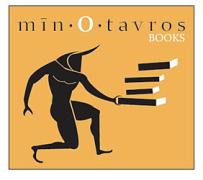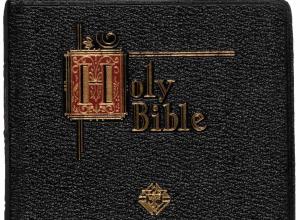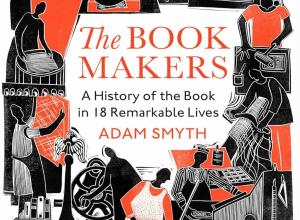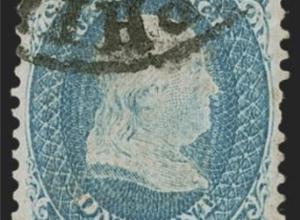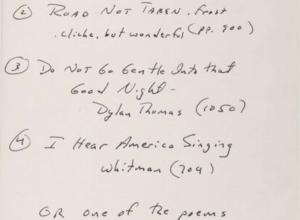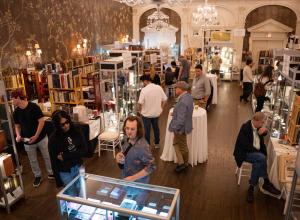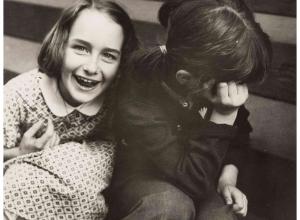Bright Young Things: Heather Pisani
Our series profiling the next generation of antiquarian booksellers continues today with Heather Pisani of Glenn Horowitz in New York:
How did you get started in rare books?
I began thinking about books as objects early. The elementary school I attended often had author readings, so as a kid I had this wonderful little collection of inscribed children's books from people like Stephen Kellogg and Bernard Waber. It wasn't until later though, during a trip to England as an undergrad at Vassar, that I bought my first "rare" book. It was a nineteenth-century edition of Middlemarch - not actually rare, it turned out... just old. Before I graduated, I was also lucky enough to take a very small, irregularly offered senior seminar on Medieval and Renaissance manuscripts that was co-taught by a Dante scholar and the curator of Special Collections. I wasn't quite sure at that point where I was headed but knew I liked old books and manuscripts. After graduation, I spent two years in the Rare Book Room at the Strand. Then I attended grad school, during which time I interned in the Rare Book Division at the 42nd Street and Fifth Avenue branch of NYPL. For a little while, I was torn about whether I wanted to be in the trade or in a library - both have always had a certain allure for me.??
What is your role at Glenn Horowitz?
I'm the firm's full-time literary archivist. I work with individual rare books and manuscripts but my main job is cataloging complete archives. In a nutshell, I'm dispatched to homes, offices, storage spaces, attics, barns, and - my personal favorite - "work sheds," where I usually get to spend a few days with an author, cataloging drafts, letters, notebooks, diaries, etc. We usually end up sharing a meal or two and discussing their creative process.
I understand that you've done a lot of traveling on behalf of the firm. Any favorite bookish places you've visited?
I joke that I peaked early! Within my first year I went to Australia to work with John Coetzee. The room where he writes definitely qualifies as a favorite place. ??
What do you love about the book trade?
Probably most things. I think a wonderful aspect of the field is that there's always more to learn, whether about the history of the book itself or the life and work of a particular author. I also appreciate that it's an evolving field right now, not least because of the internet and rise of born digital materials. I'm not sure whether the latter is for better or worse - I struggle to find email printouts as compelling as holograph manuscripts or autograph letters - but at least it's an interesting issue. ??
Favorite rare book (or ephemera) that you've handled?
The answer to this changes constantly. Right now I'd say that Samuel Beckett's undergrad text books rank very high on my list. We had three volumes of French literature from his freshman year, each with his ownership signature - Samuel B. Beckett / Trinity College / Dublin / Michaelmas Term - 1923 - and each copiously annotated. His English translations filled the margins and there were endearing notes to self - like "Learn by heart" - as well as words defined repeatedly, suggesting he had trouble remembering them. I came in to the office on a Saturday to catalogue those. ??
What do you personally collect?
I have a nice group of inscribed books from authors I've worked with. I was collecting 19th-century publishers' bindings for a time. At one point when I was living in Prague I became set on finding the first Czech edition of Milan Kundera's Unbearable Lightness of Being. It was brought out by a Canadian publishing house and is hard to come by, so whenever I see one I buy it. I have two. ??
Thoughts on the present state and/or future of the rare book trade?
I don't think print books are going to vanish. I do think that in a survival-of-the-fittest kind of way the market will only support the best, most desirable copies. Manuscripts and correspondence are a bit trickier. Archives will be comprised of an increasing amount of electronic material, so instead of notebooks and letters we have hard drives, stacks of obsolete discs, email accounts, etc. Born digital material is a quagmire of technological, practical, and intellectual issues that are now being dealt with formally by creators, dealers, and repositories in terms of preservation guidelines and collection policies.
Any upcoming fairs or catalogues?
We recently published Write a Madder Letter if You Can: the Letters of Jack Kerouac to Ed White - the catalogue is available for $25 and the collection of letters themselves for $1.25 million. We've also been circulating a PDF list of Seamus Heaney Books from the collection of James O'Halloran that will be available as a print catalogue this summer. My colleague Lauren Walsh is putting the finishing touches on a very cool catalogue of the archive of dust-jacket designer Philip Grushkin, also coming out this summer. No fairs, but at the end of June we're moving to a new location that will include a street-level gallery space on 54th Street to open in the fall.






